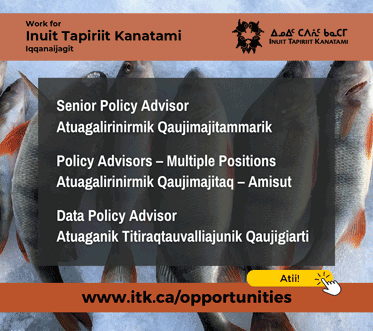Changes to national Inuit groups proposed
DWANE WILKIN
Inuit Tapirisat of Canada (ITC) should work more closely with the Canadian arm of the Inuit Circumpolar Conference (ICC), delegates to a special members meeting in Iqaluit said last week.
The first step will be to reorganize both national political organizations so that they share the same board of directors.
Delegates to the ITC meeting passed a resolution reducing their number of board members to four, partly as a cost-cutting measure.
The changes to the group’s bylaws are to be presented at ITC’s annual general meeting in September.
Both groups are finding it more difficult to obtain federal funding for their work, and have come under criticism from regional land-claims organizations in the past for being increasingly irrelevant.
Under bylaw changes proposed last week, presidents of the birthright corporations in the four land-claim settlement areas would alone sit on ITC’s board of directors. They would, in turn, each appoint three persons to act as delegates for their regions.
In addition, the ITC president would automatically become the vice-president of ICC, and vice-versa.
Not everyone is happy with the changes, though.
“It really has taken the individual voice away,” lamented Madeline Alexander-Redfern, a beneficiary living in Ottawa who travelled to Iqaluit for the meeting.
“It’s a very concentrated elite that’s in control, of not only in the regions but now also our national voice.”
There are an estimated 7,000 Inuit living in the South. Attempts to create a special seat on ITC’s board of directors for Inuit living outside the settlement areas have never succeeded.
Inuit groups off to Europe
The Inuit Tapirisat of Canada is travelling to Europe to lobby politicians to support an international trapping code that would avert a ban on aboriginal fur imports.
Inuit lobby groups from across the Canadian Arctic will visit a number of European countries next month. They hope to convince Europe’s Environment Council of Ministers to approve the International Agreement on Humane Trapping Standards at their June 19-20 meeting in Luxembourg.




(0) Comments